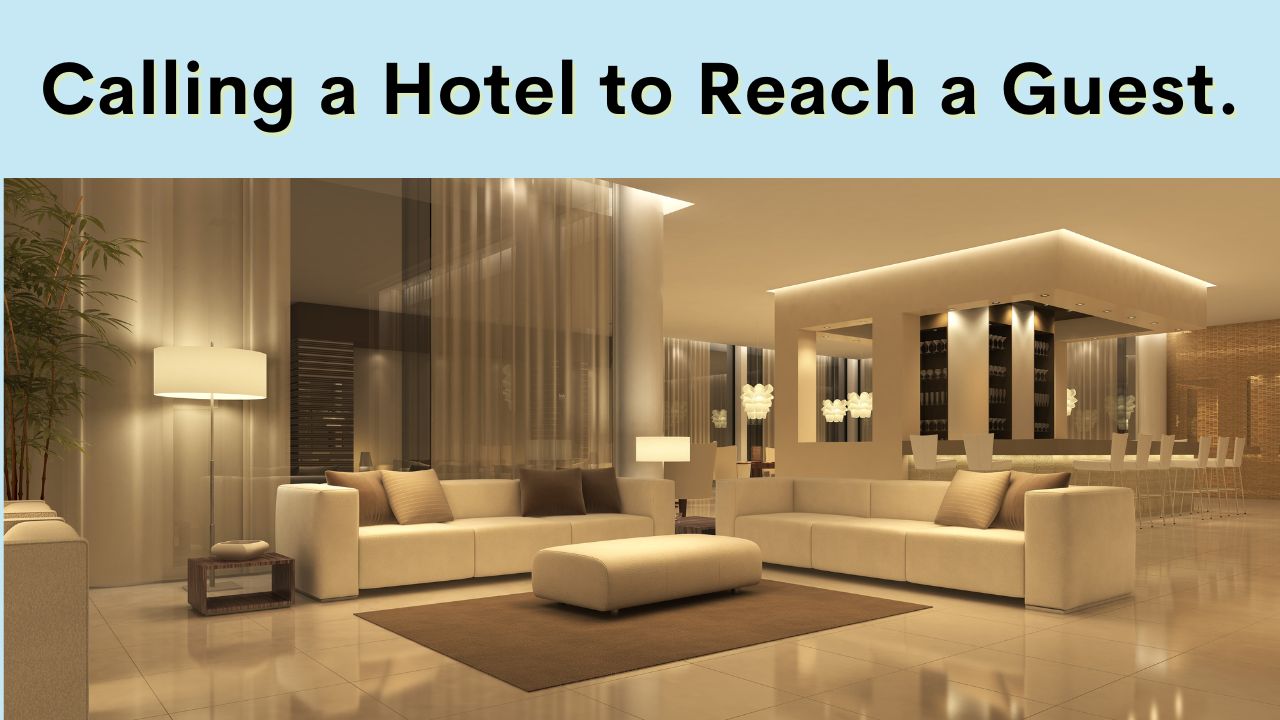Yes, you can call a hotel and ask for a guest, but privacy policies may restrict the information they can provide. Calling a hotel to inquire about a guest involves nuances related to guest privacy and hotel policy.
Hotels prioritize the safety and confidentiality of their guests, which often means that they might not confirm whether a person is staying at the hotel without permission from the guest. It’s common for hotels to offer a call transfer to the guest’s room, but they typically will not provide room numbers or disclose personal details.
Understanding the balance between helpful customer service and privacy can be tricky for hotels. They need to ensure that the guest’s consent is taken before connecting anyone over the phone. Always remember to respect privacy guidelines and the hotel’s discretion when you attempt to reach a guest through their accommodation.
Privacy Policies In Hotels
Guest Information Confidentiality
Most hotels uphold a strict stance on safeguarding guest information. To protect guests, hotels often do not disclose the presence or personal details of guests to anyone asking over the phone or in person. This policy ensures security and privacy, offering peace of mind to travelers.Exceptions And Disclosures
Although the rule is to maintain confidentiality, exceptions may occur. In select scenarios such as legal requirements or when guest safety is at stake, hotels might disclose information. For example:- Laws demanding disclosure
- Emergencies involving the well-being of the guest or others
- Requests from law enforcement with appropriate documentation

Credit: theyouthhotels.com
Legitimate Reasons To Contact A Hotel Guest
Emergency Situations
In urgent cases, contacting a guest through the hotel is vital.- Family emergencies: Illness or accidents affecting close relatives
- Natural disasters: Informing guests about immediate dangers
- Urgent business matters: Critical issues that can’t wait until check-out
Personal Messages And Deliveries
Important messages or packages can necessitate guest contact.- Surprise gifts or flowers needing careful handling
- Essential documents like passports or business contracts
- Personalized messages such as birthday wishes or event invitations
Also Read: Does Landlord Have To Pay For Hotel During Repairs California
Procedures For Calling A Hotel Guest
Protocol For External Calls
Hotels have in place a specific protocol for handling external calls. This aims to protect guests and maintain privacy. Here are key points to remember:- Identification: You must provide the full name of the guest.
- Security Check: The hotel may verify your identity or relation to the guest.
- Guest Consent: The hotel will ask for the guest’s permission before connecting any call.
- Do Not Disturb: If the guest has requested privacy, the call won’t be connected until permission is granted.
Guest Options For Calls
Guests at hotels have options regarding incoming calls. Understanding these options can inform your attempt to reach them.| Option | Description |
|---|---|
| Direct Line | Some hotels may provide a direct line to the guest’s room. |
| Messaging Service | Hotels can take a message if the guest is unavailable. |
| Call Forwarding | Guests can request calls be forwarded to a personal device. |
| Privacy Settings | Guests can choose not to receive any calls. |
Always remember, the privacy and preferences of hotel guests govern the flow of external communications. For a successful call, familiarize yourself with these procedures and guest options.
Technology Impact On Guest Privacy
Modern Communication Channels
Hotels integrate various digital platforms to interact with guests. These channels offer convenience but also pose challenges for privacy. Consider these key points:- Mobile Apps provide check-in and room requests without a call.
- Social Media enables direct messaging for quick service.
- Email and Text folios protect privacy over paper slips.
Enhanced Security Measures
Hotels are boosting guest privacy through advanced security tactics. Look at the following:- Data encryption shields online transactions.
- Strict verification prevents unauthorized information access.
- Surveillance systems monitor for security while respecting privacy.
Navigating Legal And Ethical Considerations
Laws Governing Privacy
Every country has privacy laws that hotels must follow. These laws dictate how personal information should be handled. In the United States, for instance, the Privacy Act of 1974 sets the standard for government agency record-keeping on individuals, including guests staying at hotels operated by or for federal agencies. Although private hotels aren’t directly governed by this act, similar standards of privacy are often upheld by state laws and the industry’s own privacy policies.- Hotel guest information is generally considered private.
- Disclosure of guest identity without consent can lead to legal action.
- Data protection legislation like GDPR in Europe adds an extra layer of complexity.
- Hotels must establish clear privacy policies that align with local laws.
Ethical Implications Of Information Sharing
Beyond the legality, the ethical handling of guest information is vital for maintaining trust. Hotels must balance the need for discretion with responsibilities they might have to ensure the safety of their guests and staff. They typically do not reveal if someone is staying at their property without a legitimate reason. Relevant ethical considerations include:- The guest’s right to privacy and confidentiality.
- The potential harm that could come from sharing information.
- The hotel’s reputation and commitment to customer service.

Credit: www.peeryhotel.com
Frequently Asked Questions For Can You Call A Hotel And Ask For A Guest
Can You Call A Hotel And Ask If Someone Stayed There?
Privacy laws often prevent hotels from confirming guests’ stays. Always respect confidentiality and contact guests directly when necessary.
Can You Call A Hotel And Ask For A Room Number?
Yes, you can call a hotel to ask for a room number, but for privacy and security reasons, staff typically won’t provide this information without guest consent.
How Do You Call A Guest At A Hotel?
To call a guest at a hotel, use the internal phone system and dial the room number or ask the front desk to connect you.
Can I Find Out If Someone Is Staying At A Hotel?
To find out if someone is staying at a hotel, respect their privacy and the hotel’s policy. Usually, hotels don’t disclose guest information without consent for security reasons. Contact the person directly or ask the hotel to pass a message.
Conclusion
Reaching out to a hotel to inquire about a guest is possible, respecting privacy laws and hotel policies. Always ensure you have legitimate reasons before contacting the front desk. For urgent matters, guidelines can assist in connecting you swiftly and maintaining the professionalism expected in such interactions.
Remember, courtesy and clarity are crucial in your communication.
 Travelers Journey Hub
Travelers Journey Hub




